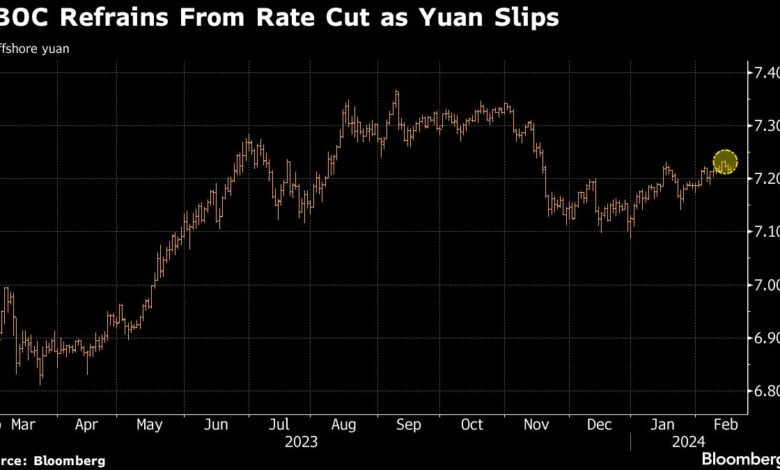China Holds Key Rate Steady as Yuan Limits Room for PBOC Moves

(Bloomberg) — China refrained from cutting a key policy interest rate as its central bank sought to shield the yuan from volatility, underscoring the challenges policymakers face as they try to manage economic risks and pressures from deflation.
Most Read from Bloomberg
The People’s Bank of China held the interest rate on its one-year policy loans at 2.5% on Sunday while injecting a small amount of cash into the financial system, both moves in line with expectations among most economists surveyed by Bloomberg. The move came after the yuan slipped to a three-month low in offshore trading last week amid a resurgence in the dollar.
Chinese authorities are in a quandary. On one hand, looser monetary policy can lead to lower funding costs and spur more economic activity. On the other, they are trying to avoid a depreciation of the yuan as policy diverges with the US, where bets on rate cuts by the Federal Reserve are being pushed back as inflation remain sticky. While a weaker currency may provide a boost for exporters, it can also increase the risk of capital flight.
“This morning’s outcome does not preclude any further easing” by the central bank, said Frances Cheung, a rates strategist at Oversea-Chinese Banking Corp Ltd. in Singapore, who added that external factors may play a role in any timing on rate cuts by the PBOC.
China’s economy is flagging under the weight of a property crisis, weak confidence and deflation pressures. The central bank’s reluctance to ease aggressively underscores the mismatch with hopes among investors for bazooka-style stimulus — a disparity that’s in part fueling a selloff in the nation’s stock market.
While the central bank hasn’t cut policy rates in several months, authorities have still taken a raft of other steps intended to restore confidence. Earlier this month, the PBOC pumped long-term cash into the banking system with a cut to the reserve-requirement ratio for lenders. Officials have also tightened rules on the lending of shares for short selling and boosted support for the yuan via the central bank’s daily reference rate.
The PBOC has also been pumping cash into the financial system through its key lending facility for 15 straight months.
Sunday’s net injection of 1 billion yuan ($139 million) conducted via the MLF was the smallest infusion since August. It appeared aimed at keeping liquidity balanced after the week-long Lunar New Year holiday, said Ming Ming, chief economist at Citic Securities.
Chinese banks may still cut their lending rates in the coming week, said Ming, adding that such a move would “help lower financing costs and support stable recovery of the economy.”
The Financial News, a newspaper backed by the PBOC, reported Sunday that banks may reduce their rates this month. There’s a higher possibility of a cut to the five-year Loan Prime Rate, a reference rate for mortgages, according to the paper, which cited market participants it didn’t identify.
“China is heading to a slightly laxer monetary policy,” said Gary Ng, senior economist at Natixis SA, who added that there’s “still room” for a rate cut of 10 basis points next month.
What Bloomberg Economics Says …
“The People’s Bank of China’s decision to refrain from cutting its key rate — despite deepening deflation, a property rout and sluggish demand — raises concerns it will fall behind the curve — in a repeat of last year’s missteps.”
— David Qu, economist
Read the full report here.
OCBC’s Cheung flagged deflation as a consideration for the PBOC as it decides whether to cut policy rates.
Price pressures have worsened in recent months, with consumer costs dropping last month at the fastest pace since the global financial crisis. A separate measure of economy-wide prices marked its longest slide since 1999 in the fourth quarter of last year.
Early travel and spending data from the Lunar New Year holiday offered some signs of a pickup in consumer spending, though muted initial box office figures suggested people may be reducing their spending per trip.
–With assistance from Jing Zhao.
(Updates with additional context on the yuan, state media report. An earlier version of this story corrected for a typo in the lead quote.)
Most Read from Bloomberg Businessweek
©2024 Bloomberg L.P.
Source link





